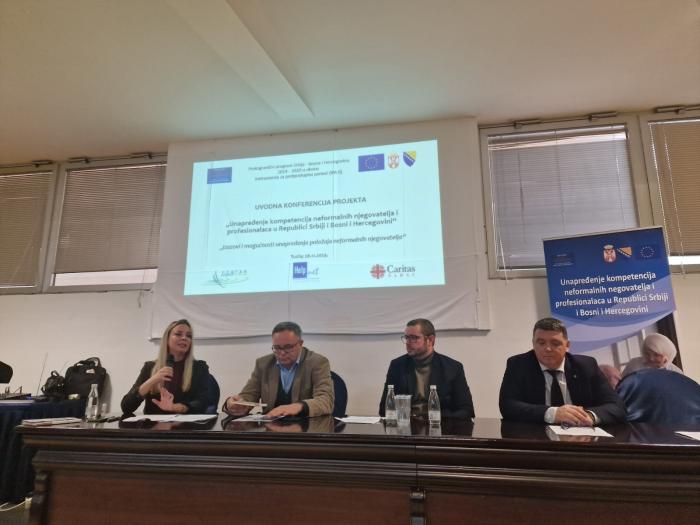Center for Social Innovation in Tuzla, in collaboration with partner organizations Centre for support and inclusion HELP NET from Belgrade and Caritas Šabac, recently conducted the introductory conference for the project “Improving the competencies of informal caregivers and professionals in the Republic of Serbia and Bosnia and Herzegovina”. The conference aimed to analyze the issues and challenges faced by informal caregivers in Bosnia and Herzegovina and the Republic of Serbia, with a specific focus on the Tuzla Canton and the Mačva District. The objective was to explore opportunities for improving their position within the social and healthcare systems.
Over 120 representatives from social and healthcare institutions and non-governmental organizations in the Tuzla Canton, along with partner organizations from Serbia, participated in the conference. Demographic and health trends indicate an inevitable increase in the need for long-term care in Bosnia and Herzegovina. In recent years, there has been a noticeable rise in the number of social care beneficiaries requiring various forms of support and care. In such conditions, the role of informal caregivers becomes increasingly vital, as their assistance is crucial not only for older individuals in need of care but also for younger people with disabilities and other chronic illnesses who are unable to function independently on a daily basis.
Informal care involves unpaid care services provided within the private sphere of households, within existing relationships with family members, spouses, friends, or neighbors. Informal caregivers are individuals who provide usually unpaid care to someone with a chronic illness, disability, or other long-term health condition, outside the professional or formal employment framework.
The goal of informal care is to enable individuals who are unable to independently care for themselves to achieve the highest possible quality of life, in line with their individual capabilities. To improve the position of informal caregivers, the project envisages a series of activities contributing to the development of sustainable non-institutional social and healthcare services or the enhancement of existing services for informal caregivers and professionals in the social and healthcare system. This involves cross-border exchange, collaboration, and synergy to increase the quality and efficiency of providing care services to older individuals and others in need of care.
Source: IPA II CBC programme Serbia – Bosnia and Herzegovina


